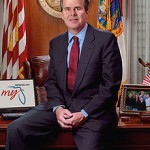How The GOP Field Disagrees With Florida’s Education Plan

Stan Honda / AFP
The four Republican presidential candidates met for a debate in Jacksonville Thursday.
Do the Republican candidates for president support the ‘Florida model’ for education?
On issues of accountability and school choice the answer is yes.
However, many in the field criticize the federal role in education and would reduce or eliminate the agency.
That puts some of the candidates in conflict with former Gov. Jeb Bush, a Republican and the architect of much of Florida’s education policy since he first took office in 1999. Bush has argued the federal government should push states to raise standards on curriculum and testing.
Bush has also supported the goals of Race to the Top, a stimulus-funded grant program that encourages states to overhaul their education system. Florida is using its $700 million grant to pay for the development of a cutting-edge statewide system intended to measure teacher performance and effectiveness.
But anything with a federal connection is poisonous in current GOP politics, especially if tied to Democratic President Barack Obama.
Adam Emerson is the policy director for school choice with the Washington D.C.-based Thomas B. Fordham Institute. Emerson said the debate about whether a federal department of education should exist ignores political reality.
The noise also distracts from the more important question about what role the federal government should play in ensuring states approve and meet high standards.
“What we don’t have,” Emerson said, “is any nuance in particular just how the federal role could enhance what the states can do and enhance how the states can react.
“What you are seeing, unfortunately, in the GOP run up to a presidential nominee is the same sort of tired old debates over eliminating…the federal role in education,” he said. “And I think we can have smarter conversations about that now.”
Analysts also say that jobs and the economy overshadow all other issues among voters, so any differences between Florida voters and the candidates on education are likely to have a minimal impact.
With the exception of U.S. Rep. Ron Paul of Texas, each of the candidates has taken their turn backing away from a previously held position.
Gingrich once toured with U.S. Education Secretary Arne Duncan in support of Race to the Top, but now wants a diminished role.
“I didn’t mean to say that if I did.,” Gingrich said when asked if the federal government has a role ensuring standards and accountability at an October education forum. “I do think there’s a very narrow research and dissemination role for the federal government.”
Former Massachusetts Gov. Mitt Romney told a Miami audience that Race to the Top has done some good things, but walked that back the next day.
“I don’t support any particular program that he’s describing,” Romney said at a September debate after Texas Gov. Rick Perry referenced a Romney statement that Race to the Top “makes some sense.”
Likewise, Rick Santorum now regrets his vote for No Child Left Behind, the federal education law passed under President George W. Bush that set detailed standards for states.
“What you are seeing, unfortunately, in the GOP run up to a presidential nominee is the same sort of tired old debates over eliminating…the federal role in education. And I think we can have smarter conversations about that now.”
-Fordham Institute analyst Adam Emerson
“I admit, I’m a strong conservative, but I’m not perfect,” Santorum said at debate earlier this month. “President Bush’s signature initiative of No Child Left Behind, I voted for it, I shouldn’t have. It was something that I said, and I will say publicly, that we should repeal.
Those positions would mean no stimulus-funded Race to the Top grant program that is paying for the development of a statewide teacher evaluation system which could become a national model. It also means less pressure to sign on to Common Core, a set of national curriculum standards designed to ensure students are ready for college or careers upon graduation.
All but five states have adopted Common Core. Supporters say the state-designed standards are crucial to improving the nation’s education system.
And that puts the GOP field at odds with former Gov. Jeb Bush, who developed the “Florida model” and is now working to export it to states across the country. Bush favors Common Core and has praised Race to the Top despite criticizing other portions of the federal stimulus plan.
University of South Florida political scientist Susan McManus said those differences are minor.
The Republican field agrees with Florida policies on a fundamental issue: School choice. Emerson said the candidates also agree with Bush and Florida’s policies of accountability, the issue is how to implement them.
“Each of these candidates is asking for more choice at the local level and more local control,” McManus said. “But across the board there’s less emphasis on testing.”
McManus said any differences over education are likely to have little effect on Tuesday’s vote.
“Education is not really front and center in the presidential cycle,” she said. “They’ve got to focus much, much more on economic recovery.”


